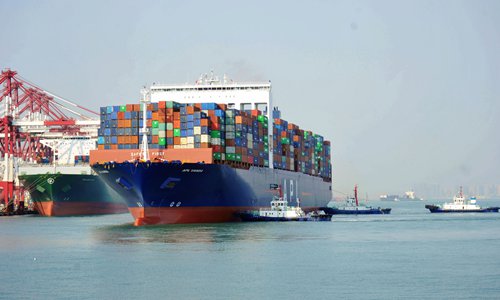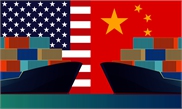Chinese experts blast US’ renewed trade hostility
Move 'harms US firms' by taking away access to huge market

A cargo ship from the US moors at a port in Qingdao, East China's Shandong Province. Photo: IC
As the November US midterm elections approach, the Biden administration escalated its hard stance toward China very recently by announcing that it will keep additional tariffs on Chinese imports in place, and imposing further restrictions on chip-related exports to China.Experts said that the Biden administration's move of seeking political benefits at the cost of the wellbeing of US people and companies will backfire, leading to higher domestic inflation and potential economic recession, while losing the US' technological edge in some major industries due to lack of access to one of the world's largest and fastest growing markets.
The Biden administration said on Friday it will keep additional tariffs on hundreds of billions of dollars worth of Chinese imports in place during a review of the duties. The Office of the United States Trade Representative (USTR) said since it had received requests from companies and other interested parties to maintain the "Section 301" tariffs imposed by former president Donald Trump, it will start a formal review of the tariffs, a process that could take months, Reuters reported on Saturday.
"Some US politicians openly called tariffs on Chinese goods 'a significant piece of leverage' in the US-China trade relationship, showing that they want to show 'toughness' in the tariff issue against China amid the current poisoned political atmosphere while thinking about 'removing tariffs' in exchange for some concessions from China," Gao Lingyun, an expert at the Chinese Academy of Social Sciences in Beijing, told the Global Times.
But imposing additional tariffs on Chinese products is a wrong move by the US in the first place, and it is ridiculous for the US to use it as a bargaining chip against China, Gao noted.
The USTR reportedly claimed that it has received requests from over 400 domestic producers and trade associations to maintain the "Section 301" tariffs imposed by Trump. However, "citing the concerns of only over 400 American entities while ignoring the majority's appeal for normal economic and trade relations with China, the Biden administration's move reflects its nationalism and political motivations in its bid to escalate its hard stance toward containing China's development," Li Yong, deputy chairman of the Expert Committee of the China Association of International Trade, told the Global Times on Sunday.
"While making common people and US companies pay for his political aim of winning more votes, US President Joe Biden risks throwing the US economy into a potential recession while seeing the US' technological edge being erased," he said.
While US firms are under growing scrutiny from the government over what they sell to China, especially in the high-tech sector, the Biden administration has been reportedly mulling moves to restrict their investment in Chinese technology companies.
The White House is in discussions with Congress on legislation requiring US firms to disclose beforehand possible investments in certain Chinese industries, Bloomberg reported, citing people familiar with the matter. It said the Biden administration is discussing ways to establish a system that would give the government the power to block such investments.
"US companies cannot afford to lose the huge Chinese market," Li said. As a result of less exposure to end users, US tech companies will see a drop in market valuation, have insufficient R&D funding to boost their original innovation, and will eventually end up losing their competitiveness.
He urged the US to give up its zero-sum mentality and listen attentively to the sensible and pragmatic voices of US companies, and bring bilateral relations back onto the right track of sound and steady development as soon as possible.
Shares of US chipmaker Nvidia, for example, tumbled around 13 percent after it disclosed new US restrictions on artificial intelligence chip sales to China, reportedly affecting approximately $400 million in potential sales in the third quarter.
Amid mounting pressure, the company later announced that Washington authorized order fulfillment and logistics through the company's Hong Kong facility through September 1, 2023, according to media reports.
"The industrial structure of the two countries is complementary. So if Washington wants to go against economic laws to distort the complementary structure through administrative power, it is doomed to fail in the long run," Gao said.
In the first seven months of this year, China's actual use of foreign capital jumped 21.5 percent year-on-year to $124 billion, data from the Chinese Commerce Ministry (MOFCOM) showed.
Investment from the US surged 36.3 percent year-on-year, according to MOFCOM.
China has developed advantages in attracting foreign capital, including widened market access and a better business climate. Moreover, with economic stabilizing policies being rolled out and taking effect, the prospects of the Chinese market are highly attractive to foreign investors amid a gloomy global environment, experts said.



